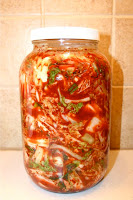 I don’t know that there is a more versatile condiment than kimchee. This staple of the Korean diet is made from napa cabbage that is allowed to ferment with red pepper. You can eat it with rice. You can eat it in soups. You can fry it up in a savory pancake batter. Anyway you like your kimchee, its sweet, spicy, and sour flavors will add to nearly any dish. Kimchee is actually easy to make and there is no substitute for fresh homemade stuff. There are as many ways to make kimchee as there are homes in Korea. Everyone has their own family recipe so you really can’t go wrong. I have a dear friend from Korea who taught me this simple way to make kimchee using fresh ingredients.
I don’t know that there is a more versatile condiment than kimchee. This staple of the Korean diet is made from napa cabbage that is allowed to ferment with red pepper. You can eat it with rice. You can eat it in soups. You can fry it up in a savory pancake batter. Anyway you like your kimchee, its sweet, spicy, and sour flavors will add to nearly any dish. Kimchee is actually easy to make and there is no substitute for fresh homemade stuff. There are as many ways to make kimchee as there are homes in Korea. Everyone has their own family recipe so you really can’t go wrong. I have a dear friend from Korea who taught me this simple way to make kimchee using fresh ingredients.
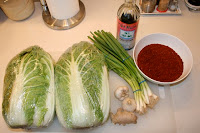 For my batch of kimchee I will be using the following:
For my batch of kimchee I will be using the following:
2 large heads of napa cabbage
1 cup of salt
2 bunches of green onions
2 heads of garlic
about 2 inches of fresh ginger
about 2 cups of Korean red chili flakes
about 1/4 cup of Vietnamese nuoc mam fish sauce.
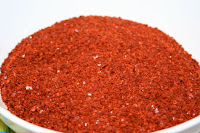 I would say the most important ingredient for getting the right flavor is the Korean red pepper. I have tried other red pepper powders but nothing else will give you that authentic taste. My kimchee uses a lot (2-3 large fistfulls). It is spicy but not really that spicy. Korean red pepper has a wonderfully sweet fruity taste that accompanies the spice. It is no where near as hot as a cayenne pepper. So don’t be shy about using this much. I buy it in large bags from my local Asian grocery.
I would say the most important ingredient for getting the right flavor is the Korean red pepper. I have tried other red pepper powders but nothing else will give you that authentic taste. My kimchee uses a lot (2-3 large fistfulls). It is spicy but not really that spicy. Korean red pepper has a wonderfully sweet fruity taste that accompanies the spice. It is no where near as hot as a cayenne pepper. So don’t be shy about using this much. I buy it in large bags from my local Asian grocery.
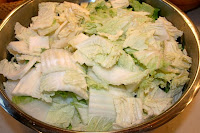 To prepare the cabbages I first cut them into quarters so I can easily wash and drain them. They are then cut into pieces. You can cut them whatever size you want. I prefer them about 2 inches or so. I layer the cabbage pieces salting the layers liberally. This is allowed to sit for a couple of hours. The cabbage will drain off some of its water and will shrink in volume by about 1/3. The cabbage should be rinsed very well with cold water to remove as much salt as possible and drained.
To prepare the cabbages I first cut them into quarters so I can easily wash and drain them. They are then cut into pieces. You can cut them whatever size you want. I prefer them about 2 inches or so. I layer the cabbage pieces salting the layers liberally. This is allowed to sit for a couple of hours. The cabbage will drain off some of its water and will shrink in volume by about 1/3. The cabbage should be rinsed very well with cold water to remove as much salt as possible and drained.
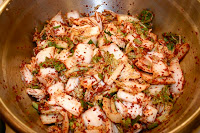 Chop the garlic finely and mince the ginger. The onions should be cut on a bias. I prefer them about 1/2 inch in size but you can cut them larger or smaller to your liking. Mix all the rest of the ingredients together well. I find that my hands work best for mixing all the ingredients. Kimchee recipes usually have some kind of fish flavor. Some call for the addition of raw oysters. Some for the brine from fermented shrimp. I find that the Vietnamese nuoc mam sauce does a great job of imparting that subtle but not overpowering flavor of the fish. The sauce smells awful on its own but you will not taste it in the kimchee. Trust me. The kimchee will not be right without it. You can use more or less to taste. If I have it I usually add a splash of the juice from my last batch of kimchee to make sure the good souring bacteria are present.
Chop the garlic finely and mince the ginger. The onions should be cut on a bias. I prefer them about 1/2 inch in size but you can cut them larger or smaller to your liking. Mix all the rest of the ingredients together well. I find that my hands work best for mixing all the ingredients. Kimchee recipes usually have some kind of fish flavor. Some call for the addition of raw oysters. Some for the brine from fermented shrimp. I find that the Vietnamese nuoc mam sauce does a great job of imparting that subtle but not overpowering flavor of the fish. The sauce smells awful on its own but you will not taste it in the kimchee. Trust me. The kimchee will not be right without it. You can use more or less to taste. If I have it I usually add a splash of the juice from my last batch of kimchee to make sure the good souring bacteria are present.
Pack the kimchee tightly into a large jar or any non-reactive container you have loosely covered. Leave this sit at room temperature for 2-3 days and then store in the refrigerator. Be careful that your container has enough room at the top to allow the gases to escape. My jar shown above is probably too full and likely to spill kimchee liquid out of the top as it ferments. Kimchee will slowly ferment in the fridge. You can eat it as soon as you like. The younger it is the sweeter the cabbage tastes. If you like it more sour just let it sit longer. Actually you should try tasting it at different stages to see how it changes. In Korea they eat fresh kimchee as well as fermented kimchee. I like to let some kimchee stay in my fridge for months so I have some really sour stuff to cook with.
I have been wanting to try to make kimchi at home for a while. This sounds pretty simple.
It really is pretty easy. Thanks for stopping by.
Hey Greg,
yU MAKE kimchi? WOW!
I just posted my ultimate kimchi recipe and cannot wait to try it again. Yours look fab! What else can you kimchi? mustard leaves? kohlrabi?
Hi Greg,
I love kimchi and thought I’d give your recipe a try this weekend. Lat me ask where the liquid in the jar in your picture comes from. Do the cabbage and other ingredients give off liquid?
Thanks
Wonderful kimchee tutorial Greg. I’m definitely going to make some following your directions soon.
Great job, and very nice blogs!!!
~Mary
I looove kimchi! Your recipe looks simple… I just have to find the Korean chilli flakes and the fish sauce. It must be Vietnamese? Or I can use any other fish sauce?
Hi Edith,
Thanks for stopping by. I use Vietnamese fish sauce (nuoc mam) and it works great. I think in Korea they use their own kind of fish sauce.
Korean chili flakes are critical I would say.
Anonymous, yes, the liquid comes from the cabbage. I don’t add any.
this is the first time I am trying Kimchi, thanks for your detailed recipe.